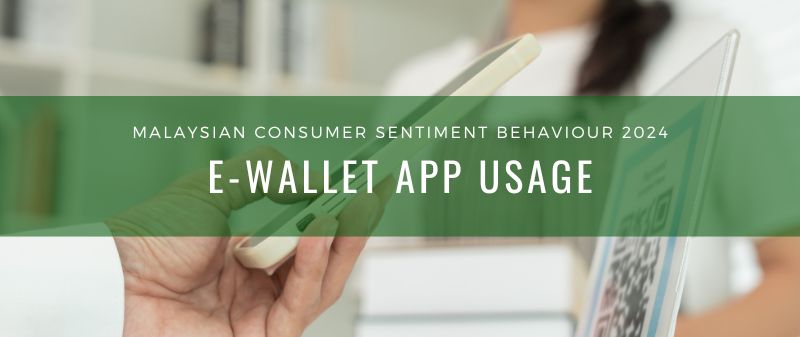May 08, 2023 11:36AM
Is Ecommerce in Malaysia Stagnating in this Post-Pandemic World?

The Covid-19 pandemic has accelerated the growth of ecommerce as more and more consumers have turned to online shopping due to the closure of physical stores during lockdowns and concerns about crowded public spaces. This shift in consumer behaviour has led to a surge in demand for ecommerce platforms and services, as businesses scramble to adapt to the new reality of a more digital marketplace.
Ecommerce has become increasingly popular in Malaysia, with many consumers enjoying the advantages it offers. These benefits include a wider variety of options, the ability to easily compare prices, as well as the convenience of shopping from home. However, there are some drawbacks to online shopping, such as the inability to physically try out a product before purchasing it. Additionally, there may be a delay in receiving the product, which can be frustrating for those who want immediate gratification.
As Malaysia emerges from the pandemic, the ecommerce industry faces a new set of challenges, including rising costs and supply chain disruptions. The big question on everyone's mind is whether Malaysians will continue to embrace online shopping or return to traditional brick-and-mortar stores.
To assist brands in developing effective sales channel strategies for 2023, Vodus conducted a consumer pulse survey during Q1 of this year. The survey focused on exploring the shopping channels preferred by post-pandemic consumers in Malaysia for various product categories. By analyzing the results of the survey, Vodus aims to help brands maximize their market capture in the region.
The Consumer Pulse Survey gathered data from a diverse sample of 2285 individuals in Malaysia, including East Malaysia, to gain insight into the consumer sentiment and purchasing habits of Malaysians across various product categories. The sample was carefully selected to ensure it accurately represents the population of Malaysia as a whole.
Non-Durable FMCG
According to our survey, the majority of Malaysian consumers, around 70%, still prefer to purchase their non-durable fast-moving consumer goods (FMCG) through traditional offline channels like supermarkets and sundry shops. These products include carbonated soft drinks, dairy drinks, dry groceries such as canned food, fresh groceries, ready-to-drink coffee/tea, ready-to-drink juices and popular snacks such as chips.
A small percentage of consumers who typically purchase non-durable FMCG offline are open to the idea of incorporating online shopping into their routine. Specifically, 4% of these consumers would be willing to switch from purely offline to a mixed approach of both offline and online shopping channels. This is particularly true for purchases of dry groceries, fresh groceries, RTD coffee/tea, RTD juices and snacks.
When it comes to purchasing non-durable FMCG products online, only a small percentage, around 11%, currently rely solely on online channels for their grocery needs. However, there is one product type where consumer purchasing trends are moving in the opposite direction. Carbonated soft drinks are seeing a shift from online purchases back to offline shopping. This may be due to factors such as convenience, the availability of certain brands in physical stores, and the revisiting of F&B outlets.
Durable FMCG
As with durable FMCG products, the majority of Malaysians still prefer to purchase products such as cleaning products, aromatherapy diffusers and anti-bacterial sprays through offline channels with only a small percentage, around 12%, currently relying solely on online channels for their grocery needs.
In Malaysia, there is a preference for purchasing durable products in physical stores rather than online. This is likely due to the convenience of being able to pick up these items while already out shopping for groceries and other non-durables. This trend is expected to continue in the near future with no signs of consumers in Malaysia switching more to exclusively online purchases anytime soon.
Beauty & Skincare
When it comes to beauty & skincare products, consumers often prefer to purchase offline as they enjoy the experience of testing new products and seeking advice from beauty consultants in-store for higher value items, consumers can often be concerned over the authenticity of products sold online.
According to our survey, a significant 28% of consumers in Malaysia have exclusively purchased skincare and beauty products through online channels in the last 6 months. However, it seems that Malaysians still prefer a combination of channels or offline purchases for their beauty needs.
The trend of purchasing body care, fragrances, hair care, and makeup through online only channels is expected to remain stagnant. On the other hand, there may be a shift in consumer behaviour towards offline purchases for skin care products in the future.
Consumer Electronics
When it comes to consumer electronics, our survey found that in the past 6 months, over half of survey participants had purchased these products online. While smartwatches and earphones are the most popular products purchased online.
Our survey shows that the biggest growth in online sales for consumer electronic products is expected to be in mobile phones, where online prices are much cheaper while the advancements in mobile phone technologies have slowed down greatly.
The trend for purchasing smart watches is set to shift more towards offline where trial experience is becoming a major factor in the purchasing decisions.
Is Ecommerce in Malaysia Still Growing in this Post-Pandemic Era?
Since the Covid lockdowns, Malaysians have developed a strong inclination towards outdoor activities, with shopping being the most popular choice. As a result, this will have slowed the growth of the ecommerce sector to some extent.
According to our consumer pulse survey, Malaysians still prefer to purchase FMCG, skincare, and beauty products offline, while the growth of ecommerce varies depending on the product category. However, our data suggests that the trend of "Online Only" purchases is slowing down, and we can expect to see more consumers opting for "Mixed Channels" in the next six months. This gives Malaysians the flexibility to choose where they want to make their purchases.
This shows that as much as the ecommerce sector is growing, it is not likely to dominate over offline retail purchases any time soon. As we navigate through this post-pandemic phase in Malaysia, it remains to be seen whether the ecommerce sector's massive growth was just hype or if it is here to stay for the long term.
Brands should strategize their 2023 marketing campaign to effectively market to mixed purchase channel shoppers.
By using surveys, analytics, and other tools to understand their unique needs and preferences, brands can tailor their marketing messages to better engage and convert mixed-channel shoppers.
How can Vodus help you measure your Brand Perception?
Businesses today are often left wondering how are their brands currently performing relative to their competitors. In some cases, marketing campaigns are launched in the hope of reviving a brand without fully understanding where a brand is failing or falling behind.
At Vodus Research we have developed our own Brand Health Tracking Solution, providing brands with everything they need to know about the current performance and perception towards their brand, in line with both their competitor's and target audience preferences.
We help businesses identify what drives consumers to purchase their brand as well as understand the areas where a brand can gain more value in the market.
As one of the leading market research companies in Malaysia, Vodus Research has a wealth of experience and knowledge from working with leading brands across a wide range of industries including FMCG, telecommunications, retail, consumer finance, education, property development and entertainment.
For more information on how Vodus Research can assist you in your Brand Health Tracking, contact us for a free consultation.













